Detailed Analysis of Event Life Cycle in the 2018 Winter Olympics
VerifiedAdded on 2021/06/18
|6
|1865
|261
Report
AI Summary
This report provides a comprehensive analysis of the event lifecycle of the 2018 Winter Olympics held in PyeongChang, South Korea. It examines the formation, growth, and staging phases of the event, highlighting key aspects such as the planning, stakeholder management, and execution. The report discusses the initial concept and development of the games, the growth leading up to the event, and the staging process, including venue preparation, competitor and delegate management, and the overall organization. It also offers recommendations, emphasizing the importance of effective planning, government and local committee support, and the consideration of various impacts, including political, social, economic, environmental, and technological factors. The analysis draws upon various academic sources to provide a well-rounded understanding of the event management process, concluding with insights into the long-term investments and tourism development opportunities following the global event.
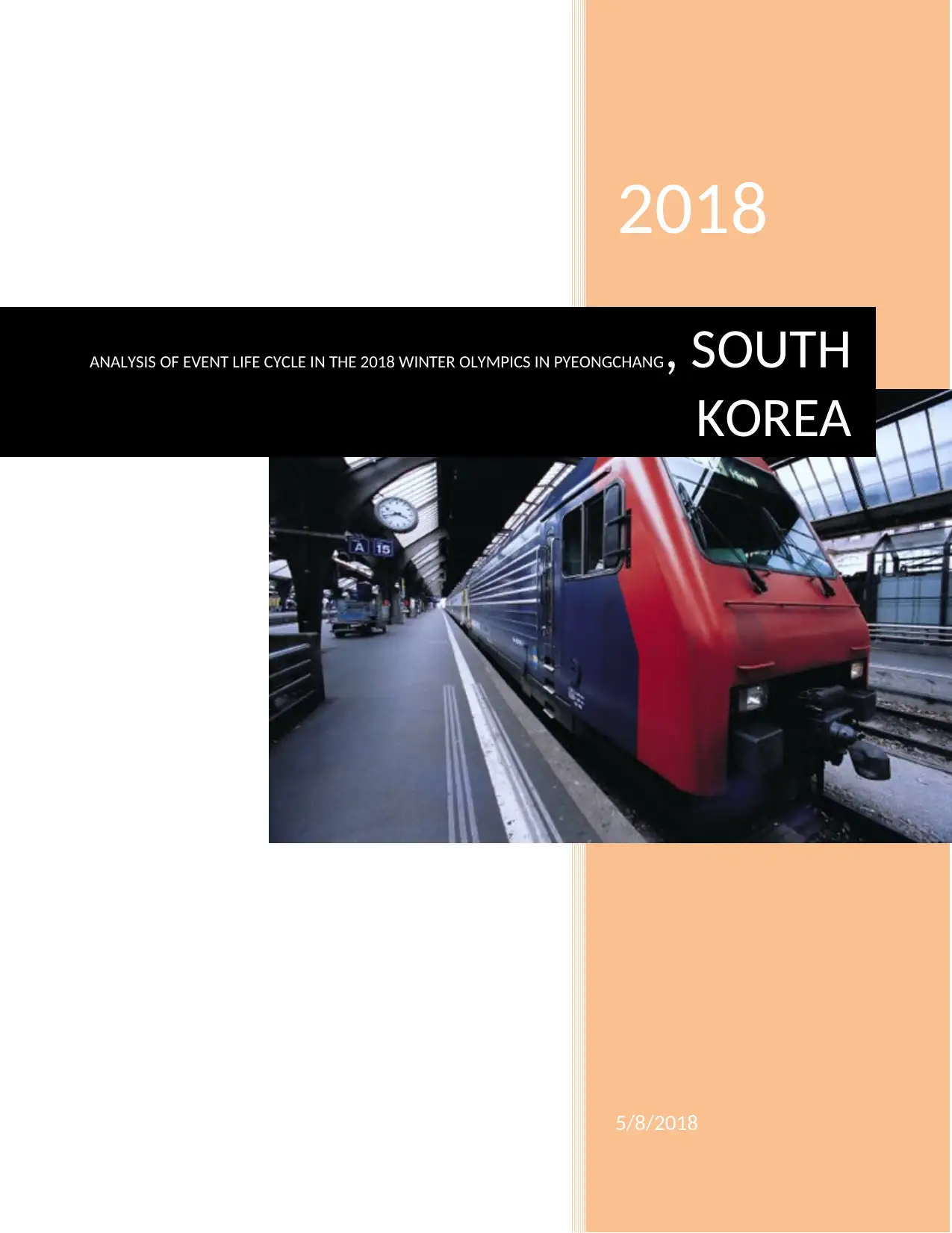
2018
5/8/2018
ANALYSIS OF EVENT LIFE CYCLE IN THE 2018 WINTER OLYMPICS IN PYEONGCHANG, SOUTH
KOREA
5/8/2018
ANALYSIS OF EVENT LIFE CYCLE IN THE 2018 WINTER OLYMPICS IN PYEONGCHANG, SOUTH
KOREA
Paraphrase This Document
Need a fresh take? Get an instant paraphrase of this document with our AI Paraphraser
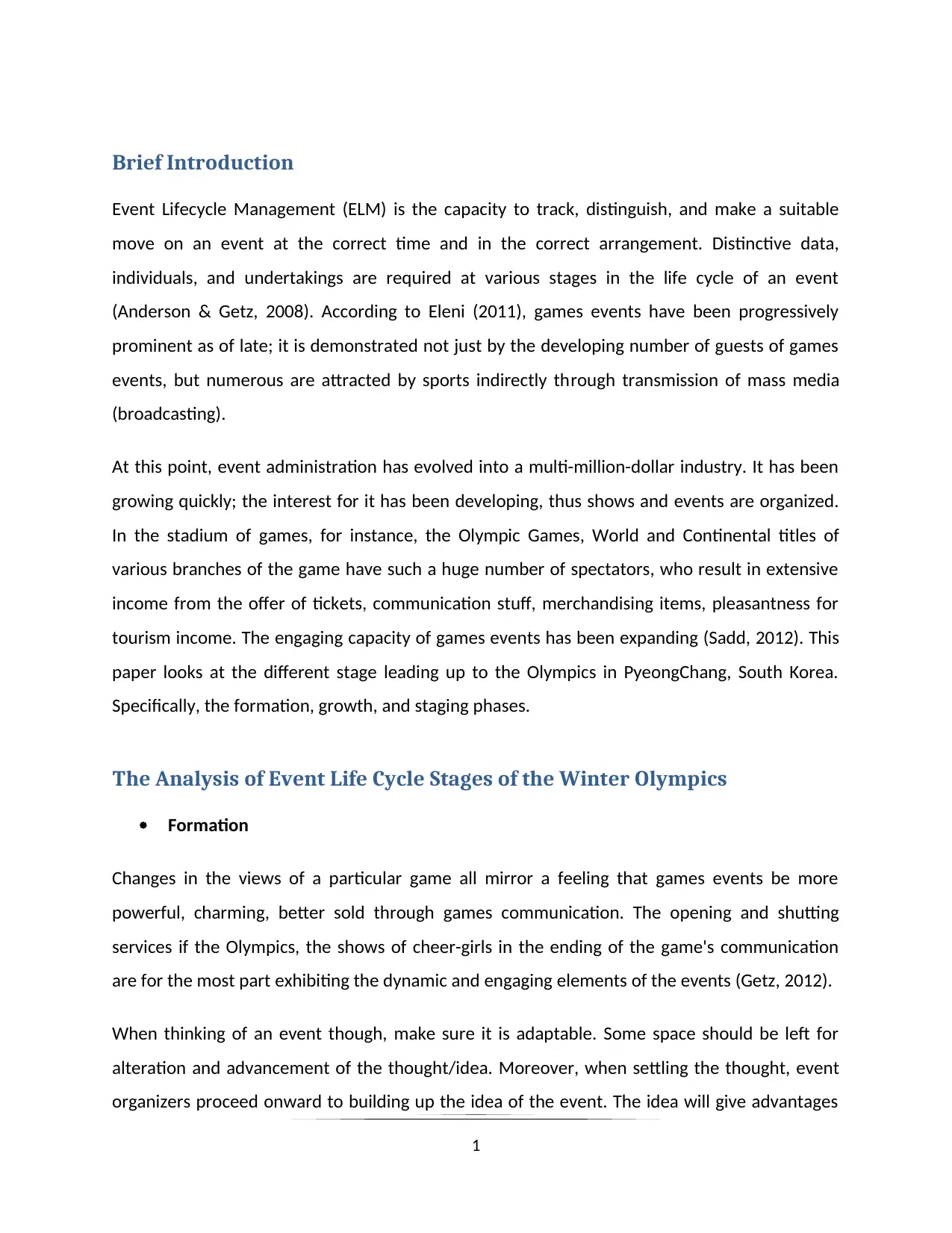
Brief Introduction
Event Lifecycle Management (ELM) is the capacity to track, distinguish, and make a suitable
move on an event at the correct time and in the correct arrangement. Distinctive data,
individuals, and undertakings are required at various stages in the life cycle of an event
(Anderson & Getz, 2008). According to Eleni (2011), games events have been progressively
prominent as of late; it is demonstrated not just by the developing number of guests of games
events, but numerous are attracted by sports indirectly through transmission of mass media
(broadcasting).
At this point, event administration has evolved into a multi-million-dollar industry. It has been
growing quickly; the interest for it has been developing, thus shows and events are organized.
In the stadium of games, for instance, the Olympic Games, World and Continental titles of
various branches of the game have such a huge number of spectators, who result in extensive
income from the offer of tickets, communication stuff, merchandising items, pleasantness for
tourism income. The engaging capacity of games events has been expanding (Sadd, 2012). This
paper looks at the different stage leading up to the Olympics in PyeongChang, South Korea.
Specifically, the formation, growth, and staging phases.
The Analysis of Event Life Cycle Stages of the Winter Olympics
Formation
Changes in the views of a particular game all mirror a feeling that games events be more
powerful, charming, better sold through games communication. The opening and shutting
services if the Olympics, the shows of cheer-girls in the ending of the game's communication
are for the most part exhibiting the dynamic and engaging elements of the events (Getz, 2012).
When thinking of an event though, make sure it is adaptable. Some space should be left for
alteration and advancement of the thought/idea. Moreover, when settling the thought, event
organizers proceed onward to building up the idea of the event. The idea will give advantages
1
Event Lifecycle Management (ELM) is the capacity to track, distinguish, and make a suitable
move on an event at the correct time and in the correct arrangement. Distinctive data,
individuals, and undertakings are required at various stages in the life cycle of an event
(Anderson & Getz, 2008). According to Eleni (2011), games events have been progressively
prominent as of late; it is demonstrated not just by the developing number of guests of games
events, but numerous are attracted by sports indirectly through transmission of mass media
(broadcasting).
At this point, event administration has evolved into a multi-million-dollar industry. It has been
growing quickly; the interest for it has been developing, thus shows and events are organized.
In the stadium of games, for instance, the Olympic Games, World and Continental titles of
various branches of the game have such a huge number of spectators, who result in extensive
income from the offer of tickets, communication stuff, merchandising items, pleasantness for
tourism income. The engaging capacity of games events has been expanding (Sadd, 2012). This
paper looks at the different stage leading up to the Olympics in PyeongChang, South Korea.
Specifically, the formation, growth, and staging phases.
The Analysis of Event Life Cycle Stages of the Winter Olympics
Formation
Changes in the views of a particular game all mirror a feeling that games events be more
powerful, charming, better sold through games communication. The opening and shutting
services if the Olympics, the shows of cheer-girls in the ending of the game's communication
are for the most part exhibiting the dynamic and engaging elements of the events (Getz, 2012).
When thinking of an event though, make sure it is adaptable. Some space should be left for
alteration and advancement of the thought/idea. Moreover, when settling the thought, event
organizers proceed onward to building up the idea of the event. The idea will give advantages
1
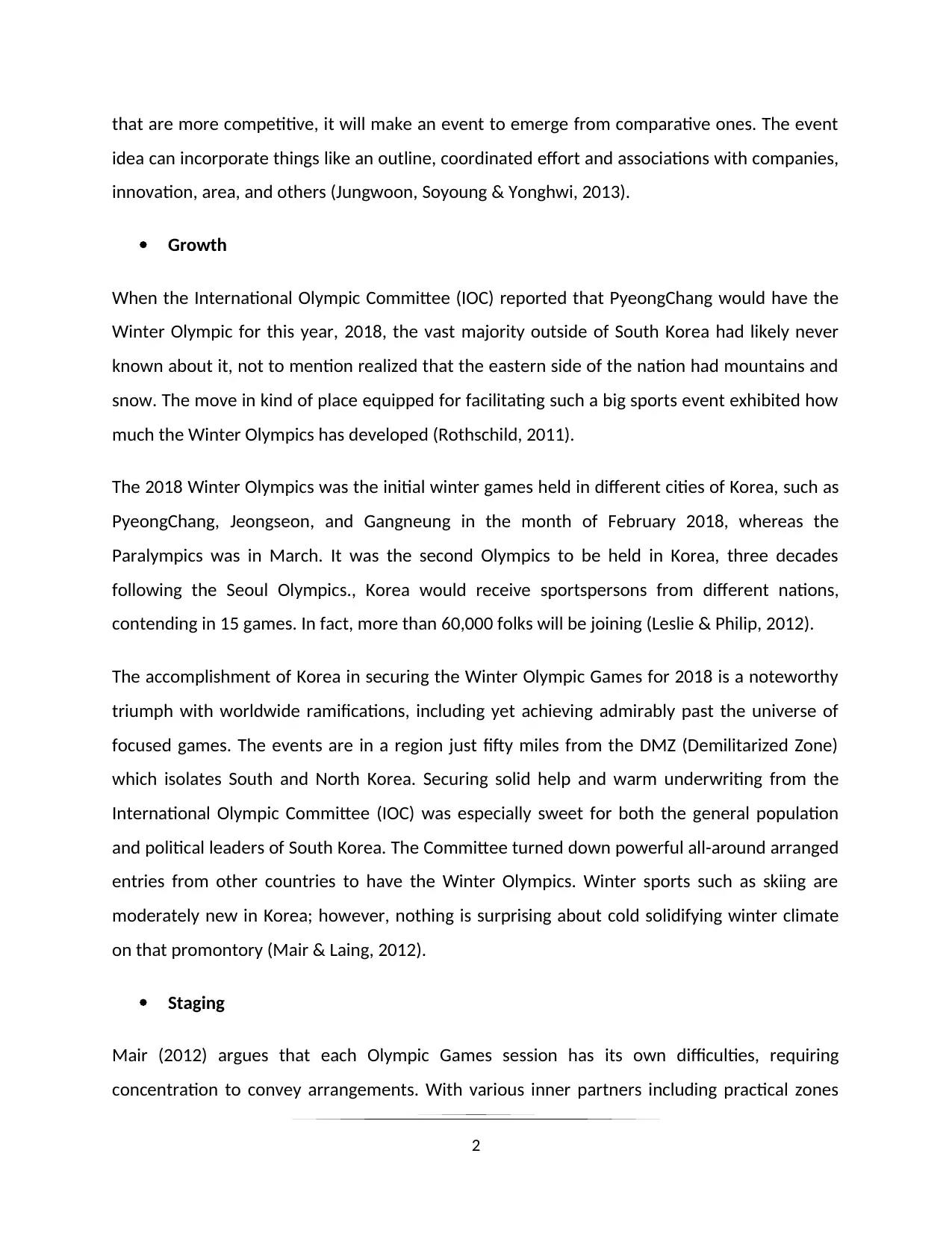
that are more competitive, it will make an event to emerge from comparative ones. The event
idea can incorporate things like an outline, coordinated effort and associations with companies,
innovation, area, and others (Jungwoon, Soyoung & Yonghwi, 2013).
Growth
When the International Olympic Committee (IOC) reported that PyeongChang would have the
Winter Olympic for this year, 2018, the vast majority outside of South Korea had likely never
known about it, not to mention realized that the eastern side of the nation had mountains and
snow. The move in kind of place equipped for facilitating such a big sports event exhibited how
much the Winter Olympics has developed (Rothschild, 2011).
The 2018 Winter Olympics was the initial winter games held in different cities of Korea, such as
PyeongChang, Jeongseon, and Gangneung in the month of February 2018, whereas the
Paralympics was in March. It was the second Olympics to be held in Korea, three decades
following the Seoul Olympics., Korea would receive sportspersons from different nations,
contending in 15 games. In fact, more than 60,000 folks will be joining (Leslie & Philip, 2012).
The accomplishment of Korea in securing the Winter Olympic Games for 2018 is a noteworthy
triumph with worldwide ramifications, including yet achieving admirably past the universe of
focused games. The events are in a region just fifty miles from the DMZ (Demilitarized Zone)
which isolates South and North Korea. Securing solid help and warm underwriting from the
International Olympic Committee (IOC) was especially sweet for both the general population
and political leaders of South Korea. The Committee turned down powerful all-around arranged
entries from other countries to have the Winter Olympics. Winter sports such as skiing are
moderately new in Korea; however, nothing is surprising about cold solidifying winter climate
on that promontory (Mair & Laing, 2012).
Staging
Mair (2012) argues that each Olympic Games session has its own difficulties, requiring
concentration to convey arrangements. With various inner partners including practical zones
2
idea can incorporate things like an outline, coordinated effort and associations with companies,
innovation, area, and others (Jungwoon, Soyoung & Yonghwi, 2013).
Growth
When the International Olympic Committee (IOC) reported that PyeongChang would have the
Winter Olympic for this year, 2018, the vast majority outside of South Korea had likely never
known about it, not to mention realized that the eastern side of the nation had mountains and
snow. The move in kind of place equipped for facilitating such a big sports event exhibited how
much the Winter Olympics has developed (Rothschild, 2011).
The 2018 Winter Olympics was the initial winter games held in different cities of Korea, such as
PyeongChang, Jeongseon, and Gangneung in the month of February 2018, whereas the
Paralympics was in March. It was the second Olympics to be held in Korea, three decades
following the Seoul Olympics., Korea would receive sportspersons from different nations,
contending in 15 games. In fact, more than 60,000 folks will be joining (Leslie & Philip, 2012).
The accomplishment of Korea in securing the Winter Olympic Games for 2018 is a noteworthy
triumph with worldwide ramifications, including yet achieving admirably past the universe of
focused games. The events are in a region just fifty miles from the DMZ (Demilitarized Zone)
which isolates South and North Korea. Securing solid help and warm underwriting from the
International Olympic Committee (IOC) was especially sweet for both the general population
and political leaders of South Korea. The Committee turned down powerful all-around arranged
entries from other countries to have the Winter Olympics. Winter sports such as skiing are
moderately new in Korea; however, nothing is surprising about cold solidifying winter climate
on that promontory (Mair & Laing, 2012).
Staging
Mair (2012) argues that each Olympic Games session has its own difficulties, requiring
concentration to convey arrangements. With various inner partners including practical zones
2
⊘ This is a preview!⊘
Do you want full access?
Subscribe today to unlock all pages.

Trusted by 1+ million students worldwide
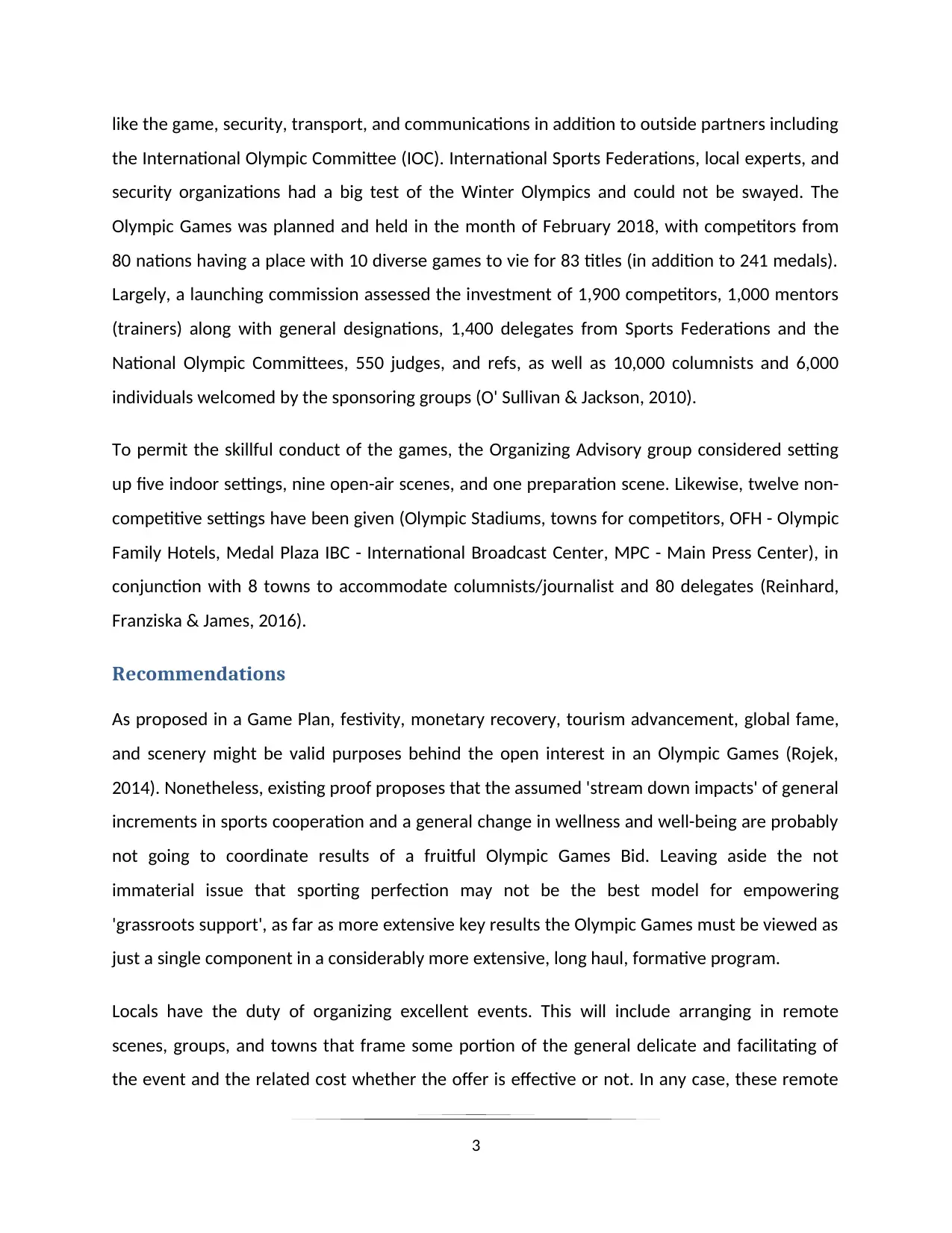
like the game, security, transport, and communications in addition to outside partners including
the International Olympic Committee (IOC). International Sports Federations, local experts, and
security organizations had a big test of the Winter Olympics and could not be swayed. The
Olympic Games was planned and held in the month of February 2018, with competitors from
80 nations having a place with 10 diverse games to vie for 83 titles (in addition to 241 medals).
Largely, a launching commission assessed the investment of 1,900 competitors, 1,000 mentors
(trainers) along with general designations, 1,400 delegates from Sports Federations and the
National Olympic Committees, 550 judges, and refs, as well as 10,000 columnists and 6,000
individuals welcomed by the sponsoring groups (O' Sullivan & Jackson, 2010).
To permit the skillful conduct of the games, the Organizing Advisory group considered setting
up five indoor settings, nine open-air scenes, and one preparation scene. Likewise, twelve non-
competitive settings have been given (Olympic Stadiums, towns for competitors, OFH - Olympic
Family Hotels, Medal Plaza IBC - International Broadcast Center, MPC - Main Press Center), in
conjunction with 8 towns to accommodate columnists/journalist and 80 delegates (Reinhard,
Franziska & James, 2016).
Recommendations
As proposed in a Game Plan, festivity, monetary recovery, tourism advancement, global fame,
and scenery might be valid purposes behind the open interest in an Olympic Games (Rojek,
2014). Nonetheless, existing proof proposes that the assumed 'stream down impacts' of general
increments in sports cooperation and a general change in wellness and well-being are probably
not going to coordinate results of a fruitful Olympic Games Bid. Leaving aside the not
immaterial issue that sporting perfection may not be the best model for empowering
'grassroots support', as far as more extensive key results the Olympic Games must be viewed as
just a single component in a considerably more extensive, long haul, formative program.
Locals have the duty of organizing excellent events. This will include arranging in remote
scenes, groups, and towns that frame some portion of the general delicate and facilitating of
the event and the related cost whether the offer is effective or not. In any case, these remote
3
the International Olympic Committee (IOC). International Sports Federations, local experts, and
security organizations had a big test of the Winter Olympics and could not be swayed. The
Olympic Games was planned and held in the month of February 2018, with competitors from
80 nations having a place with 10 diverse games to vie for 83 titles (in addition to 241 medals).
Largely, a launching commission assessed the investment of 1,900 competitors, 1,000 mentors
(trainers) along with general designations, 1,400 delegates from Sports Federations and the
National Olympic Committees, 550 judges, and refs, as well as 10,000 columnists and 6,000
individuals welcomed by the sponsoring groups (O' Sullivan & Jackson, 2010).
To permit the skillful conduct of the games, the Organizing Advisory group considered setting
up five indoor settings, nine open-air scenes, and one preparation scene. Likewise, twelve non-
competitive settings have been given (Olympic Stadiums, towns for competitors, OFH - Olympic
Family Hotels, Medal Plaza IBC - International Broadcast Center, MPC - Main Press Center), in
conjunction with 8 towns to accommodate columnists/journalist and 80 delegates (Reinhard,
Franziska & James, 2016).
Recommendations
As proposed in a Game Plan, festivity, monetary recovery, tourism advancement, global fame,
and scenery might be valid purposes behind the open interest in an Olympic Games (Rojek,
2014). Nonetheless, existing proof proposes that the assumed 'stream down impacts' of general
increments in sports cooperation and a general change in wellness and well-being are probably
not going to coordinate results of a fruitful Olympic Games Bid. Leaving aside the not
immaterial issue that sporting perfection may not be the best model for empowering
'grassroots support', as far as more extensive key results the Olympic Games must be viewed as
just a single component in a considerably more extensive, long haul, formative program.
Locals have the duty of organizing excellent events. This will include arranging in remote
scenes, groups, and towns that frame some portion of the general delicate and facilitating of
the event and the related cost whether the offer is effective or not. In any case, these remote
3
Paraphrase This Document
Need a fresh take? Get an instant paraphrase of this document with our AI Paraphraser
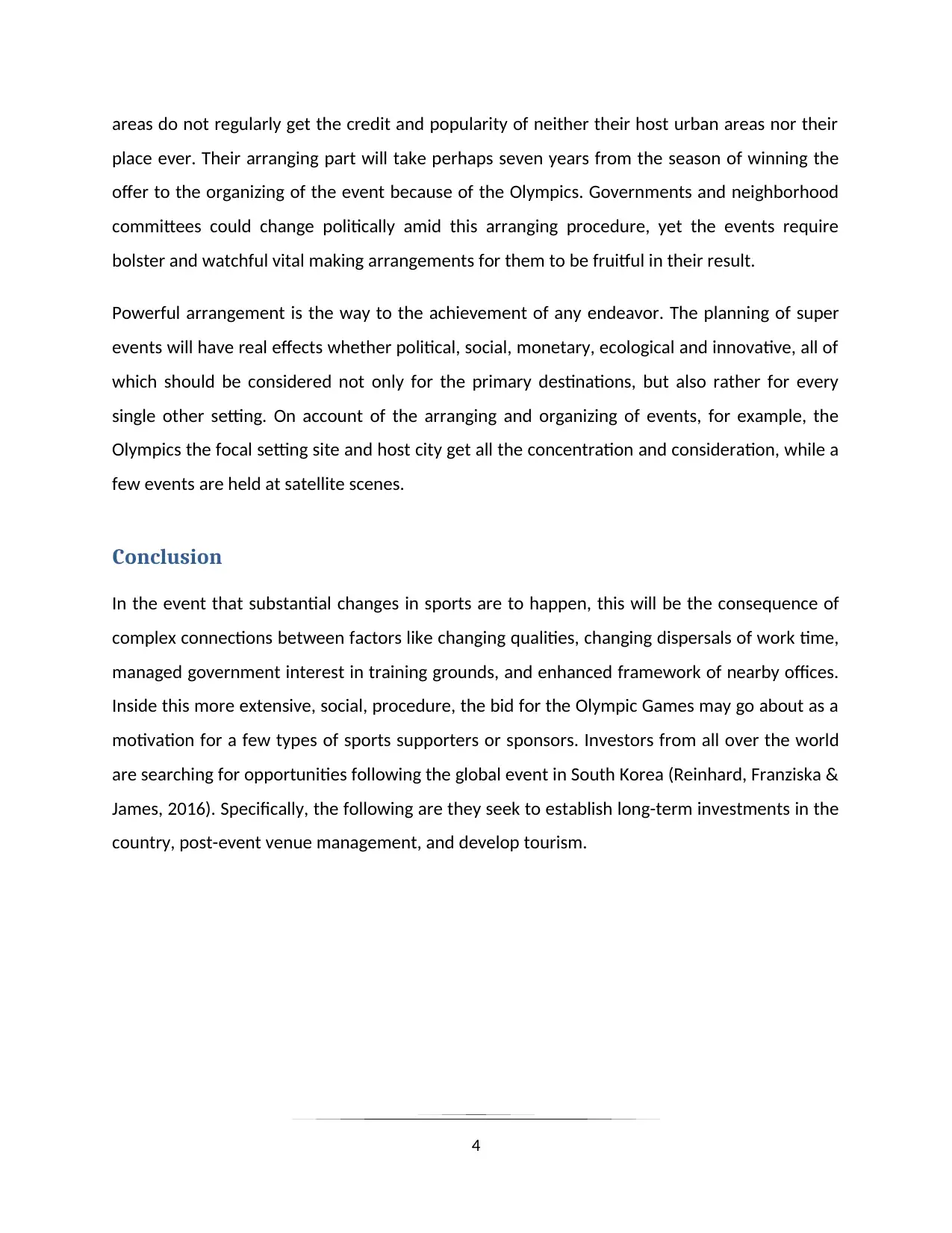
areas do not regularly get the credit and popularity of neither their host urban areas nor their
place ever. Their arranging part will take perhaps seven years from the season of winning the
offer to the organizing of the event because of the Olympics. Governments and neighborhood
committees could change politically amid this arranging procedure, yet the events require
bolster and watchful vital making arrangements for them to be fruitful in their result.
Powerful arrangement is the way to the achievement of any endeavor. The planning of super
events will have real effects whether political, social, monetary, ecological and innovative, all of
which should be considered not only for the primary destinations, but also rather for every
single other setting. On account of the arranging and organizing of events, for example, the
Olympics the focal setting site and host city get all the concentration and consideration, while a
few events are held at satellite scenes.
Conclusion
In the event that substantial changes in sports are to happen, this will be the consequence of
complex connections between factors like changing qualities, changing dispersals of work time,
managed government interest in training grounds, and enhanced framework of nearby offices.
Inside this more extensive, social, procedure, the bid for the Olympic Games may go about as a
motivation for a few types of sports supporters or sponsors. Investors from all over the world
are searching for opportunities following the global event in South Korea (Reinhard, Franziska &
James, 2016). Specifically, the following are they seek to establish long-term investments in the
country, post-event venue management, and develop tourism.
4
place ever. Their arranging part will take perhaps seven years from the season of winning the
offer to the organizing of the event because of the Olympics. Governments and neighborhood
committees could change politically amid this arranging procedure, yet the events require
bolster and watchful vital making arrangements for them to be fruitful in their result.
Powerful arrangement is the way to the achievement of any endeavor. The planning of super
events will have real effects whether political, social, monetary, ecological and innovative, all of
which should be considered not only for the primary destinations, but also rather for every
single other setting. On account of the arranging and organizing of events, for example, the
Olympics the focal setting site and host city get all the concentration and consideration, while a
few events are held at satellite scenes.
Conclusion
In the event that substantial changes in sports are to happen, this will be the consequence of
complex connections between factors like changing qualities, changing dispersals of work time,
managed government interest in training grounds, and enhanced framework of nearby offices.
Inside this more extensive, social, procedure, the bid for the Olympic Games may go about as a
motivation for a few types of sports supporters or sponsors. Investors from all over the world
are searching for opportunities following the global event in South Korea (Reinhard, Franziska &
James, 2016). Specifically, the following are they seek to establish long-term investments in the
country, post-event venue management, and develop tourism.
4
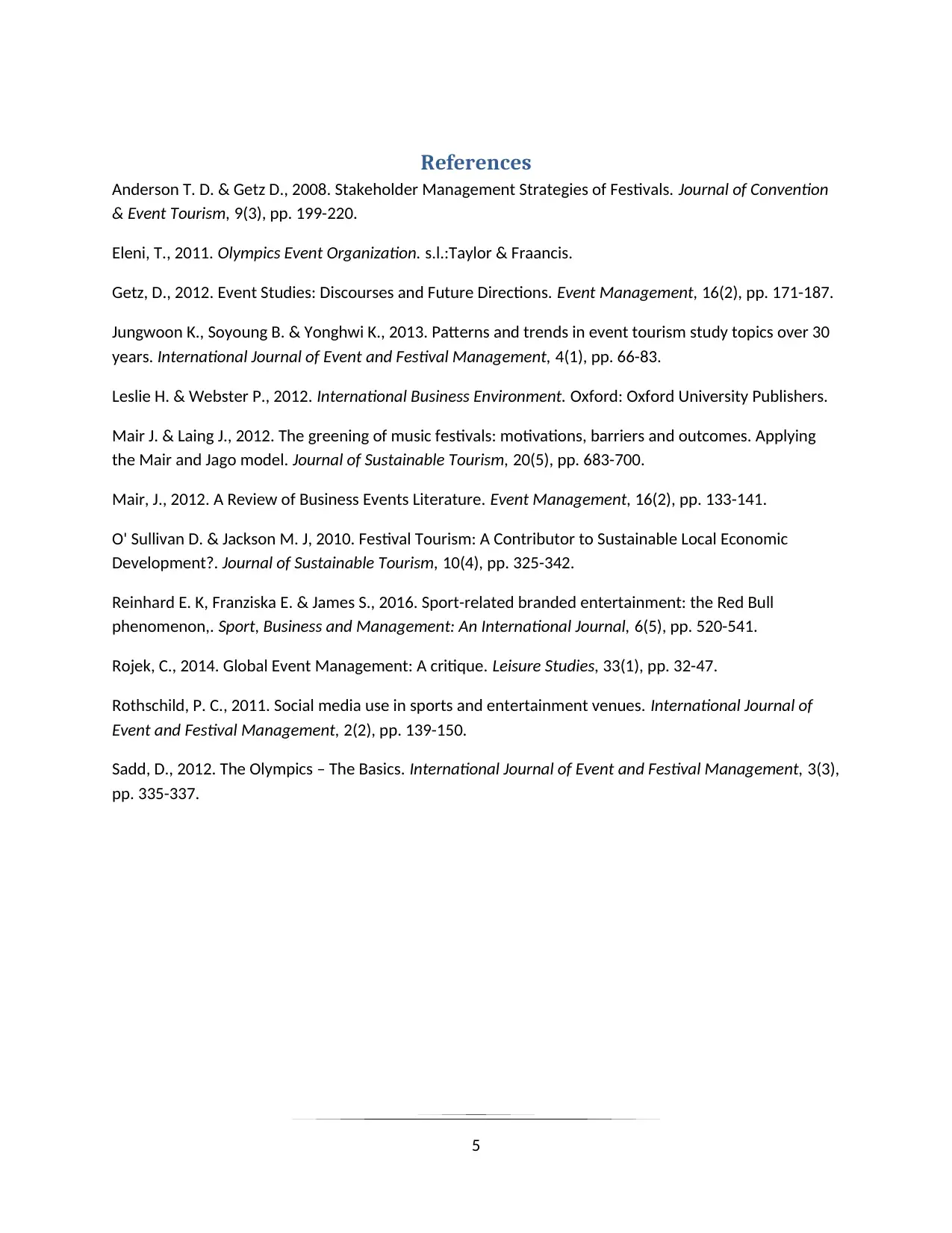
References
Anderson T. D. & Getz D., 2008. Stakeholder Management Strategies of Festivals. Journal of Convention
& Event Tourism, 9(3), pp. 199-220.
Eleni, T., 2011. Olympics Event Organization. s.l.:Taylor & Fraancis.
Getz, D., 2012. Event Studies: Discourses and Future Directions. Event Management, 16(2), pp. 171-187.
Jungwoon K., Soyoung B. & Yonghwi K., 2013. Patterns and trends in event tourism study topics over 30
years. International Journal of Event and Festival Management, 4(1), pp. 66-83.
Leslie H. & Webster P., 2012. International Business Environment. Oxford: Oxford University Publishers.
Mair J. & Laing J., 2012. The greening of music festivals: motivations, barriers and outcomes. Applying
the Mair and Jago model. Journal of Sustainable Tourism, 20(5), pp. 683-700.
Mair, J., 2012. A Review of Business Events Literature. Event Management, 16(2), pp. 133-141.
O' Sullivan D. & Jackson M. J, 2010. Festival Tourism: A Contributor to Sustainable Local Economic
Development?. Journal of Sustainable Tourism, 10(4), pp. 325-342.
Reinhard E. K, Franziska E. & James S., 2016. Sport-related branded entertainment: the Red Bull
phenomenon,. Sport, Business and Management: An International Journal, 6(5), pp. 520-541.
Rojek, C., 2014. Global Event Management: A critique. Leisure Studies, 33(1), pp. 32-47.
Rothschild, P. C., 2011. Social media use in sports and entertainment venues. International Journal of
Event and Festival Management, 2(2), pp. 139-150.
Sadd, D., 2012. The Olympics – The Basics. International Journal of Event and Festival Management, 3(3),
pp. 335-337.
5
Anderson T. D. & Getz D., 2008. Stakeholder Management Strategies of Festivals. Journal of Convention
& Event Tourism, 9(3), pp. 199-220.
Eleni, T., 2011. Olympics Event Organization. s.l.:Taylor & Fraancis.
Getz, D., 2012. Event Studies: Discourses and Future Directions. Event Management, 16(2), pp. 171-187.
Jungwoon K., Soyoung B. & Yonghwi K., 2013. Patterns and trends in event tourism study topics over 30
years. International Journal of Event and Festival Management, 4(1), pp. 66-83.
Leslie H. & Webster P., 2012. International Business Environment. Oxford: Oxford University Publishers.
Mair J. & Laing J., 2012. The greening of music festivals: motivations, barriers and outcomes. Applying
the Mair and Jago model. Journal of Sustainable Tourism, 20(5), pp. 683-700.
Mair, J., 2012. A Review of Business Events Literature. Event Management, 16(2), pp. 133-141.
O' Sullivan D. & Jackson M. J, 2010. Festival Tourism: A Contributor to Sustainable Local Economic
Development?. Journal of Sustainable Tourism, 10(4), pp. 325-342.
Reinhard E. K, Franziska E. & James S., 2016. Sport-related branded entertainment: the Red Bull
phenomenon,. Sport, Business and Management: An International Journal, 6(5), pp. 520-541.
Rojek, C., 2014. Global Event Management: A critique. Leisure Studies, 33(1), pp. 32-47.
Rothschild, P. C., 2011. Social media use in sports and entertainment venues. International Journal of
Event and Festival Management, 2(2), pp. 139-150.
Sadd, D., 2012. The Olympics – The Basics. International Journal of Event and Festival Management, 3(3),
pp. 335-337.
5
⊘ This is a preview!⊘
Do you want full access?
Subscribe today to unlock all pages.

Trusted by 1+ million students worldwide
1 out of 6
Related Documents
Your All-in-One AI-Powered Toolkit for Academic Success.
+13062052269
info@desklib.com
Available 24*7 on WhatsApp / Email
![[object Object]](/_next/static/media/star-bottom.7253800d.svg)
Unlock your academic potential
Copyright © 2020–2026 A2Z Services. All Rights Reserved. Developed and managed by ZUCOL.





